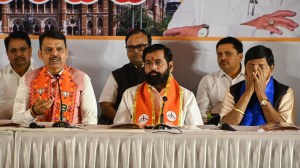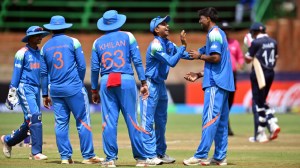Doing a Pratibha
Do feminists cheering the woman presidential candidate realise what they are doing to the cause of genuine women empowerment?

Notice the amusing eagerness with which women academics and journalists professing feminist ideas have leapt to defending Pratibha Patil8217;s nomination. With no other evidence of her suitability for the top job being adduced, it was almost as if the only thing that Patil has to commend her is her gender. This was clearly a case of making a virtue out of necessity, for Patil8217;s rather traditional persona hardly suggests a fiery feminist. Indeed, if there were any doubts about her feminist credentials, she put them to rest almost within the day with her astonishing remarks about the purdah having been invented 8220;to protect Hindu women against Mughal invaders8221;. Unfazed by this rather monumental faux pas, prominent Congresswomen continue to iterate, parrot-like, their leader8217;s description of this 8220;historic initiative8221;.
But beyond these women partisans of the Congress and the Left parties, there is a curious similarity between the two types of responses we have encountered from male politicians. Among the surprising votaries of a woman president today are the very gentlemen who have consistently, and for over a decade, opposed the women8217;s reservation bill. It is interesting to find that they are now advocates of engendering governance 8212; as long, of course, as they can ensure that they nominate the woman in question.
The patriarchs of the opposition, meanwhile, have crafted their own script of gender politics. They have strategically chosen to field only women to mock the choice of the UPA candidate: Sushma Swaraj from the NDA and Jayalalithaa for the newly-formed Third Front. Observe that the men in both these rival political formations have been careful to sit on the sidelines and stay silent, lest they render themselves vulnerable to any allegation of male chauvinism.
Perhaps inescapably, there are the politics of caste, kinship and gender present. Bhairon Singh Shekhawat happens to belong to a caste group and region of Rajasthan, from which 8212; by a curious coincidence 8212; Patil8217;s husband also hails. The contest was projected as one between a Shekhawat bahu and a male patriarch of the community. That Patil once performed the job of a deputy chairperson of the Rajya Sabha, of which Shekhawat has been the chairman for the last five years, is apparently irrelevant.
If Patil does indeed get elected, she will no doubt create history as being the first woman president. However, in a parliamentary democracy where the president is the titular head, in terms of the actual wielding of power, a woman president is not really the same thing as a woman prime minister. And surely we have been there and done that, and quite a while ago.
If, on the other hand, the numbers game stacks up in such a way that Patil loses the race, this will be a setback from which the cause of women8217;s empowerment will not recover for a long time to come. The next time a woman candidate is proposed for any important office, she will meet with ridicule. It will be assumed that she is being put up for frivolous reasons, she will be mocked for being a token candidate, and it will forever be described as 8216;doing a Pratibha8217;. We need to recognise that, by celebrating the candidature of Patil in this superficial fashion, we are not merely diminishing the highest constitutional office in the country, but also participating in a dangerous game that will, in the long run, only undermine and subvert the cause of genuine empowerment for women.
The writer is professor, Centre for the Study of Law and Governance, JNU
- 01
- 02
- 03
- 04
- 05































